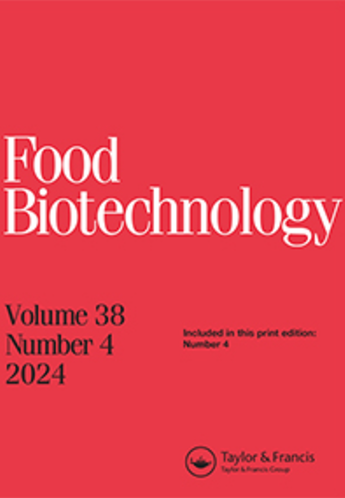以密码子优化和宿主改变为新策略改善重组甜味铜蛋白的表达
IF 1.6
4区 农林科学
Q4 BIOTECHNOLOGY & APPLIED MICROBIOLOGY
引用次数: 5
摘要
食品工业越来越关注具有良好口感特性的低热量天然甜味剂,如植物性甜蛋白。巴西豆因其强烈的甜味、天然来源以及在宽pH范围和高温下的良好稳定性而成为蔗糖的一种有吸引力的替代品。本研究以brazzein的次要形式为基本序列,根据合适的GC含量和大肠杆菌的首选密码子设计了密码子优化的brazzein基因。将合成的brazzein基因克隆到pET28a载体上,在BL21(DE3)和SHuffle®T7 Express菌株中表达。重组brazzein在BL21 (DE3)和SHuffle®T7 Express菌株中的表达量分别为1.8 ~ 2.3 mg/L和7.2 ~ 8.4 mg/L。带有his标签的重组铜蛋白缺乏甜味。去除his标签后,结果表明,除了甜度外,从SHuffle®T7 Express中纯化的brazzein蛋白的数量也高于从BL21中纯化的。这一改进可能是由于SHuffle®T7 Express在表达高二硫键蛋白方面表现更好,以及二硫键对铜蛋白甜度的影响。本文章由计算机程序翻译,如有差异,请以英文原文为准。
Improved expression of recombinant sweet-tasting brazzein using codon optimization and host change as new strategies
ABSTRACT There is increased food industry attention to low-calorie natural sweeteners with good taste properties such as in plant-based sweet proteins. Brazzein is an attractive alternative to sucrose because of its intense sweetness, natural origin, and good stability at wide pH ranges and high temperature. In the present study, by using the minor form of brazzein as the basic sequence, the codon-optimized brazzein gene was designed based on appropriate GC content and preferred codon of E. coli. Then, the synthesized brazzein gene was cloned in pET28a vector and expressed in BL21(DE3) and SHuffle® T7 Express strains. Recombinant brazzein was expressed about 1.8 to 2.3 mg/L and 7.2 to 8.4 mg/L in BL21 (DE3) and SHuffle® T7 Express strain, respectively. Recombinant brazzein with His-tag lacked the sweetness. After the removal of the His-tag, it was shown that in addition to sweetness potency, the amount of brazzein proteins purified from SHuffle® T7 Express was higher than that from BL21. This improvement could be due to the better performance of SHuffle® T7 Express in the expression of the protein with high disulfide bridges and the effect of disulfide bonds on the sweetness of brazzein.
求助全文
通过发布文献求助,成功后即可免费获取论文全文。
去求助
来源期刊

Food Biotechnology
工程技术-生物工程与应用微生物
CiteScore
3.80
自引率
0.00%
发文量
15
审稿时长
>12 weeks
期刊介绍:
Food Biotechnology is an international, peer-reviewed journal that is focused on current and emerging developments and applications of modern genetics, enzymatic, metabolic and systems-based biochemical processes in food and food-related biological systems. The goal is to help produce and improve foods, food ingredients, and functional foods at the processing stage and beyond agricultural production.
Other areas of strong interest are microbial and fermentation-based metabolic processing to improve foods, food microbiomes for health, metabolic basis for food ingredients with health benefits, molecular and metabolic approaches to functional foods, and biochemical processes for food waste remediation. In addition, articles addressing the topics of modern molecular, metabolic and biochemical approaches to improving food safety and quality are also published.
Researchers in agriculture, food science and nutrition, including food and biotechnology consultants around the world will benefit from the research published in Food Biotechnology. The published research and reviews can be utilized to further educational and research programs and may also be applied to food quality and value added processing challenges, which are continuously evolving and expanding based upon the peer reviewed research conducted and published in the journal.
 求助内容:
求助内容: 应助结果提醒方式:
应助结果提醒方式:


